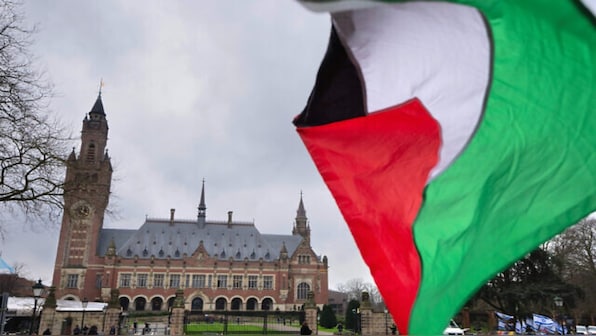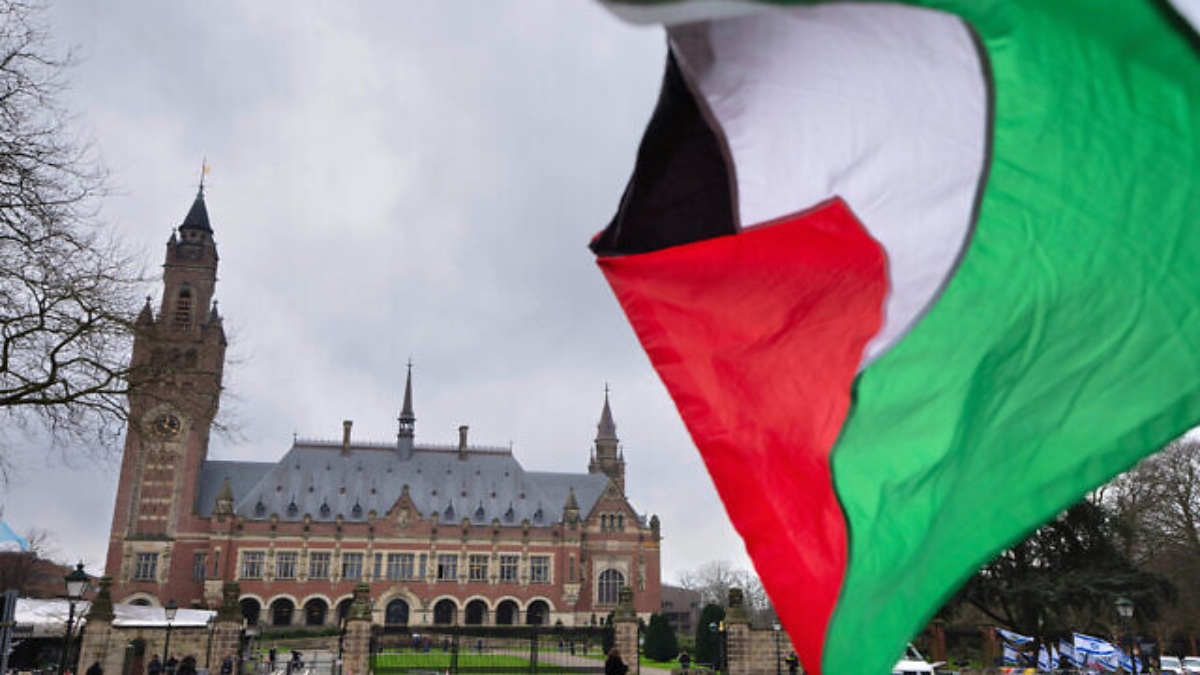The ICJ ruling on Gaza war and imbecility of rules-based order
- August 14, 2024
- Posted by: Ambassador Gurjit Singh
- Category: Gaza

Thousands have been killed and injured, along with millions displaced, as the expansion of war to other theatres and countries becomes imminent, yet the efforts to secure a ceasefire remain in limbo due to a lack of determination, equity, and enforceability. Suffering on both sides is significant
)
)
A Palestinian flag flies outside the United Nations’ highest court during historic hearings in The Hague, Netherlands, on 21 February, 2024, into the legality of Israel’s 57-year rule of West Bank and east Jerusalem.
As the wars in Eurasia and the Middle East continue to rage, they prove the imbecility of the international rules-based order. Defiance is the order of the day, with unilateralism as the preferred choice for imposing hegemony and indulging in regime change agendas.
This is true not only of superpowers but also of middle and regional powers across continents. All superpowers are, as such, sitting in glass houses and not in a moral position to accuse or condemn each other. Duplicity and double standards have become the new gold standards of international discourse. UN Security Council, UN General Assembly, and International Court of Justice (ICJ) resolutions and decisions have lost their relevance, enforceability, and validity since defiance has evolved into a new virtue of excellence and power projection.
Last week, the ICJ delivered an advisory ruling with regard to the West Bank, Israeli settlements, and the status of East Jerusalem in the context of the Israel-Palestine conflict. The ICJ ruled that “the transfer by Israel of settlers to the West Bank and Jerusalem, as well as Israel’s maintenance of their presence, is contrary to Article 49 of the Fourth Geneva Convention”. The ICJ presiding judge, Nawaf Salam, opined that “the court has found… that Israel’s continued presence in the Palestinian Territories is illegal. Israel had secured Palestinian territories, the West Bank, and the Gaza Strip in the 1967 war, which they had convincingly won. But these areas remain integral to the quest for an independent state of Palestine. Besides, the increasing and expanding settlements in the West Bank and the weaponisation of settlers have caused a new complication in the extension of the ongoing Israel-Hamas war, which has seen unprecedented violence and loss of lives, and displacement of innocent citizens on both sides during the past nine months.”
The ICJ had earlier instructed Israel not to invade Rafah, which was barely heeded. This time the ruling is merely advisory in nature and will not see any change in the ground situation, even though it has the force of morality and law. One has witnessed the ongoing cases of genocide and criminal cases alleging war crimes against Israeli and Hamas leaders by the ICJ and ICC [International Criminal Court] fly in the air. Some of their supporters on both sides have justified their acts and even threatened the officials of these multilateral institutions and agencies, further undermining the legitimacy of these institutions. Hopefully, the promoters of the rule-based order will not ignore the import of such rulings and decisions since mere lip service is going to impact their own high and hollow moral standing on these issues.
The Arab League, the Gulf Cooperation Council (GCC), and several other countries have welcomed the ruling. The UAE, which has been the first to normalise ties with Israel under the Abraham Accords, rejected all measures taken by Israel to change the historical and legal status of occupied Palestine and called for the resumption of the peace process at the earliest.
In an unusually harsh comment, the Emirati foreign ministry condemned practices that contravene international resolutions, warning that such actions “threaten further escalation and instability in the region, hinder efforts to achieve peace and stability, and therefore need to bring an end to ‘Israel’s illegal practices’ that undermine an independent Palestinian state.”
Speaking of the day-after scenario, the UAE, along with countries like Egypt, were willing to provide stability and peacekeeping forces in Gaza for holding the ceasefire and helping achieve a two-state solution since Israel is not keen to let Hamas or Fatah rule Gaza as and when they agree to withdraw.
Saudi Arabia has also once again taken over the Palestinian cause and been charged with condemning the excesses being committed by the Israeli Defence Forces (IDF) against innocent Gazans and creating inhumane conditions.
On the day-after scenario and the question of defeating Hamas, there is definitely a wide divergence between the Israeli Army leaders and PM Benjamin Netanyahu and his ultra-right political bedfellows. Ministers like Smotrich once again chose to violate the sanctity of Al Aqsa Mosque, adding fuel to the fire. He and others like him oppose any ceasefire or independent space for Palestinians, which in some ways constricts hawkish Netanyahu’s capability to even agree to a longish ceasefire. Many would like to even invoke the Hannibal doctrine, which could lead to abandoning the remaining hostages if they came in the way of the State of Israel. Hamas has been wanting to extract the maximum mileage of somehow achieving a lasting ceasefire as against Netanyahu’s unachievable resolve of destroying Hamas for good. The limitations on both ends are pretty evident. The US’ political establishment, which has been trying hard with Qatar and Egypt to bring about a ceasefire, is besieged by its domestic failures.
Yet, Secretary Blinken (June 12) at a press conference in Doha hoped that the US and its partners would soon release their plans for the postwar management of Gaza, as he is trying to recruit Arab countries to contribute a security force for Gaza in the interim. The US is unlikely to contribute forces but is ready to provide training, equipment, and other assistance for the eventual integration of Gaza and Ramallah and the two-state solution, even as the Arabs are not fully on board with his stated and some half-baked objectives for moving forward.
Thousands have been killed, several thousands injured, and millions displaced as the expansion of war to other theatres and countries becomes imminent. Apart from Hamas, Israel is confronted by Hezbollah in Lebanon and Syria and the Houthis in Yemen, which control the Red Sea traffic. These developments are serious and can go out of hand without notice, posing another major challenge for the fractious international community.
Efforts to secure a ceasefire remain in limbo due to a lack of determination, equity, and enforceability. Suffering on both sides is significant. Gaza is flattened by the increasing death toll of innocent civilians, including women and children, which will increase further radicalisation.
The Israeli political spectrum is fragmented. The IDF is stretched in terms of manpower, and opening two or three front wars will further undermine the security and stability of the countries involved as well as of the region. Recruitment of unwilling conservative Jews as well as the length of compulsory military service being increased have added to the persisting domestic challenges of the Netanyahu government. The diversion of the workforce and the war itself have adversely impacted the Israeli economy. Eilat port has recently declared bankruptcy due to a lack of traffic due to Houthi attacks in the Red Sea and beyond. Suez Canal traffic has been badly impacted, causing more economic difficulties for Egypt.
It is difficult to envisage a scenario in these conflicts where any country or people could emerge as a sure winner. In fact, everyone will be a loser in the region and beyond.
The author is the former Indian Ambassador to Jordan, Libya and Malta and is currently a Distinguished Fellow with Vivekananda International Foundation.
